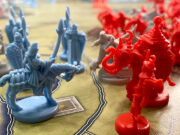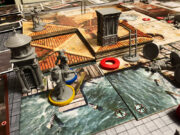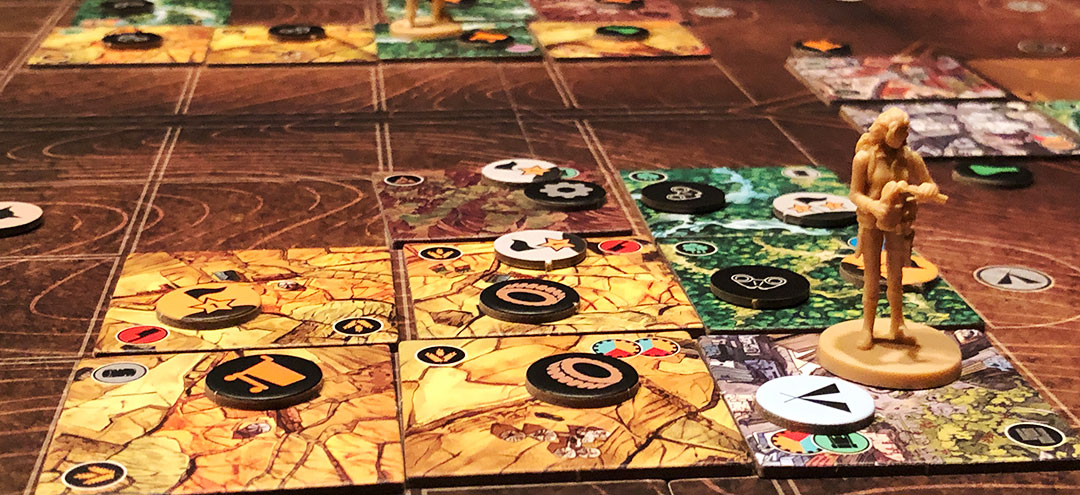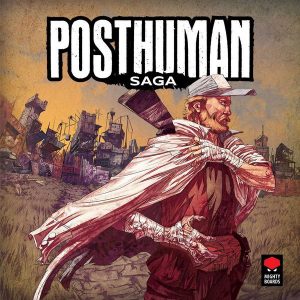 Back in 2017, fellow BGQ reviewer Brian gave us his thoughts on the exploration and survival game Posthuman from Mighty Boards. Fast forward three years and game designer Gordon Calleja once again revisits the Posthuman world, this time in a more narrative-focused game titled Posthuman Saga. This game of survival and exploration has players venturing out into the wasteland trying to complete missions for The Fortress. Was this a worthy followup to Posthuman? Let’s find out.
Back in 2017, fellow BGQ reviewer Brian gave us his thoughts on the exploration and survival game Posthuman from Mighty Boards. Fast forward three years and game designer Gordon Calleja once again revisits the Posthuman world, this time in a more narrative-focused game titled Posthuman Saga. This game of survival and exploration has players venturing out into the wasteland trying to complete missions for The Fortress. Was this a worthy followup to Posthuman? Let’s find out.
Gameplay Overview:
Each player takes control of a unique character in Posthuman Saga as they venture out into their own personal wasteland. Each round starts with revealing an event token which may provide a thematic story—with choices that need to be made—for one of the characters. Then players will either have an event, or a chance to acquire map tiles. Players must also eat now or suffer a fatigue.
Each player then gets to take one action from the following choices:
- Forge: You can move and gain resources based on your map tile location
- Map: Draw extra map tiles into your hand and place some around your character
- Camp: Heal stats or refresh tokens/cards
- Trek: Move and fight a monster. If successful, you might also be able to complete one of your mission requirements.
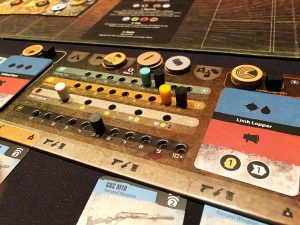
The round ends with a cleanup phase and a chance to spend XP to upgrade your character. How do you earn XP? Either through narrative encounters at the start of the round or through combat (the most likely way).
Combat is handled via a card and dice system. It’s actually quite involved but the basics of it start with a round of ranged combat followed by a round of melee combat. When you perform a combat test (which is like most skill tests in the game), you choose one skill card from your hand to play. This will provide a number of icons that, based on the weapon being used, will do damage to your enemy. You then draw a random card from your deck to add a few more icons. If you kill the enemy during ranged combat, hurray, you get XP and a bonus. If not, combat moves to melee which works much in the same way. Enemies fight back via die rolls and special abilities on their card. If you get hit in melee by a mutant you also suffer a mutation, which is usually not good.
There are also numerous ways to earn VPs during the game. The main way is by completing missions which require you to Trek on specific terrain types. You’ll have two main missions and a side mission to work on. You can also earn points by making lines of gear icons on your map tiles in a surprisingly euro-y mechanic. Overall there are quite a few ways to earn VPs.
The game ends either at the end of the 16th round, or if someone finishes all their missions and defeats the mutant boss. Most VP wins.
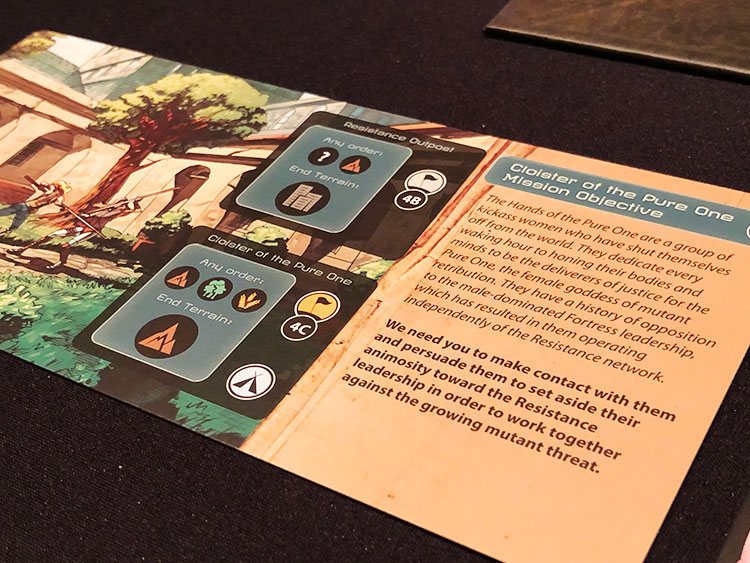
Game Experience:
Posthuman Saga is a hard game to pin down. It has some nice thematic elements, some euro-style gameplay, and even some straight-up combat. Suffice to say there is a lot going on in this title. But that also means that the game has some ups in downs. There are some things it does really well and others I wish were better.
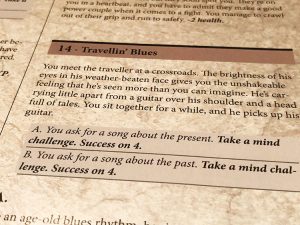
One area where Posthuman Saga really shines is when it’s embracing its theme. Posthuman Saga is a rich world with a great backstory. So when you are experiencing narrative encounters or reading the flavor text on your mission, the game gets really interesting. It’s a fallen world where the mutants are fighting against the last bastion of humanity that I find really interesting. I just wish that there was more of it in the game. Each player is only getting 2-3 story encounters per game, which feels like too small of an amount.
The other big aspect of the game is combat. Much like the game as a whole combat does somethings right, but also feels like it could have used some streamlining. What I mean is that I really like the card mechanics. Being able to choose your first card creates for some interesting decisions and you have to decide how badly you want to win the combat, as the card you choose will go to your discard pile until refreshed. Yet the randomly drawn card gets reshuffled back into your deck after combat. This creates an interesting dynamic as you must decide which cards to burn and which to save for another day. It’s almost a delayed type of push your luck where you have to plan for future turns. And as your deck gets thinner and thinner, you might be only left with cards you didn’t want, or ones that you were saving. This means your deck might be junk…or might be a lean engine of destruction for a few battles.
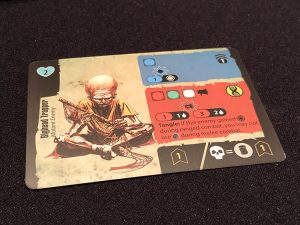
But on the other hand, combat can sometimes get pretty fiddly as you have to check all kinds of numbers and stats as monsters have a card full of icons, abilities, and dice to roll. It’s anything but streamlined and will most likely feel overbearing to new players. Yet once you get a feel for it, it works fine. But the learning curve is a little steep and it can feel kind of lengthy for what it is.
But winning combat is the main way to progress in the game. Not only do you get to drop down markers to complete parts of your mission (assuming you are on the right map tile), but you also earn XP and rewards. Each character has a unique upgrade deck and some of those powers are really nice. They do things like adding extra cards to your skill deck, or giving you bonuses whenever you take some of the default actions.
Yet one of the biggest issues I had with the game was with the food system. Each day you must eat food or suffer a fatigue, which in turn will drain morale, health, or even combat cards. I felt like I was wasting way too many of my limited actions (you only get 1 per round) foraging for food. It got tedious at times and I found myself wishing that feeding was only every other round. It took the focus away from the interesting part of the game and made it more about bookkeeping.
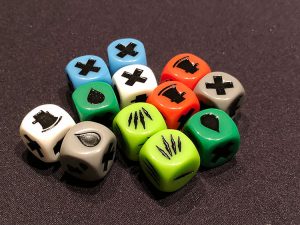
Finally, let’s talk about player scaling. Posthuman Saga is a game that plays best with 1-2 players, hands down. For the most part, there is no player interaction in the game. Other than tile drafting at the start of certain rounds, you’ll be exploring your own nook of the world and I will in mine. So a 2p game is not much different than a 4p game…other than length. With 4 players, expect a brutal amount of downtime if its a combat heavy round. Frankly, I don’t think I’d ever want to play this with more than 2. However, I can safely say that it includes an excellent, well thought out solo mode. Gordon changed up the gameplay some for solo and it was a lot of fun racing against time to complete my missions.
Final Thoughts:
Posthuman Saga is a hard one to nail down as it does a lot of things right, but also felt like it could have used just a tad more development in a few areas. Yet when things are clicking, Posthuman Saga is a great game. It’s just bogged down by a few fiddly rules here and some excessive bookkeeping. But despite all my gripes, I still found myself enjoying my plays of it quite a bit. I loved leveling up my characters, finding new weapons and allies, and reading the thematic stories.
I appreciate how designer Gordon Calleja likes to branch out into new paths when he designs his games. If you are looking for a great solo game, or one for two players, you can have a lot of fun in Posthuman Saga. For more players than that though, I’d probably look elsewhere.
Final Score: 4 Stars – A unique post-apocalyptic game that, despite its flaws, I still found to be pretty enjoyable.
 Hits:
Hits:
• Thematic world is fun to take part in
• Enjoy leveling up and finding equipment for my character
• Lots and lots of replay value
• Solo mode works really well
Misses:
• Daily feeding can feel like a chore
• Combat could have used a bit more streamlining
• 1-2 players max unless you are ok with excessive downtime




